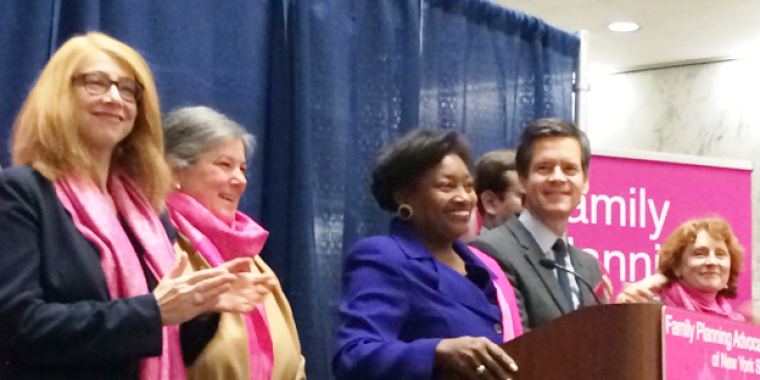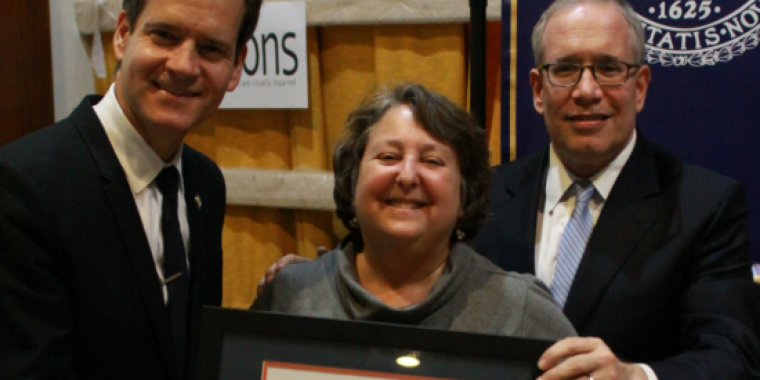
Senator Brad Hoylman Introduces "Sammy's Law" to Allow NYC to Lower Its Speed Limit As Traffic Fatalities Increase and Automobile & Cycling Use Rises During COVID-19 Pandemic
December 7, 2020
NEW YORK -- Today, State Senator Brad Hoylman (Manhattan-D/WFP) introduced “Sammy’s Law” to allow New York City to reduce speed limits on city. The bill would repeal the current requirement that speed limits in New York City cannot be lower than 25 mph or lower than 15 mph in school zones to provide the City with another tool to achieve the goals of the Vision Zero initiative and reduce traffic fatalities. “Sammy’s Law” is named after Samuel Cohen Eckstein, a 12 year-old who was killed by a driver on Prospect Park West in 2013 and introduced on what would have been his 20th birthday.
State Senator Brad Hoylman said: “As the New York City body count from traffic fatalities grows to a six-year high, it makes absolutely no sense that Albany won’t let the City lower its speed limit. Sammy’s Law will give New York City the power to lower speed limits in a way that is tailored to neighborhoods’ actual safety needs. Reducing traffic speed is not only critical due to the rising number of traffic fatalities, but also because of increased car use, bike ridership and outdoor dining and shopping during the COVID-19 pandemic.”
Danny Harris, Executive Director of Transportation Alternatives, said: “Sammy’s Law would save lives on city streets for generations to come. By allowing lower speed limits it recognizes that the safety and wellbeing of New Yorkers is more important than anything else. We are grateful for Senator Hoylman advancing this bill and will work to ensure its passage.”
Christine Berthet, Co-Founder and VP of the CHEKPEDS Pedestrian Advocacy Group, said: “This bill is critical so that New York City gets the flexibility to apply the most appropriate speeds for implementing Open Streets and Vision Zero.”
Joan Dean, Member of Families for Safe Streets, and Grandmother of Samuel Cohen Eckstein, said: “Our family knows all too well that speed kills. Going just a little slower can be the difference between life and death, particularly for those walking and biking on our streets. My 12-year-old grandson Sammy was killed by a reckless driver who was rushing to get to work. A year later, a 5-year-old boy was hit crossing the street in the same exact location. But the other boy survived because the speed limit had been lowered by 5 mph. On behalf of everyone in Families for Safe Streets, we are so grateful to Senator Hoylman for putting the lives of our family, friends and neighbors above the need to get to our destinations a few minutes sooner.”
Lower speed limits in New York City, authorized by the State Legislature in 2014, contributed to a 36 percent decline in pedestrian mortalities at priority locations in the City. However, current state law still mandates a minimum speed limit of 25 mph and 15 mph in school zones. This is despite findings that an estimated 30% of pedestrians struck by motor vehicles at an impact speed of 25 mph will sustain serious injury and about 12% will die. Each one mph increase in speed resulted in nearly a three percent increase in the mortality rate. As of November 29, 2020, there have been a total of 224 fatalities from car-related traffic incidents in New York City, a 14.9% uptick from the same time last year. On top of this year’s trends, 2019 saw a 200% increase in cyclists killed from car crashes in New York City with a 6% increase in pedestrian traffic fatalities.
By widely authorizing speed limits of lower than 25 miles per hour, New York City would join other dense American cities such as Washington, DC, Portland, OR, Boulder, CO Seattle, WA, and Minneapolis and St. Paul, MN.
Share this Article or Press Release
Newsroom
Go to Newsroom


